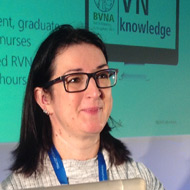
Every patient is an individual – especially if they are very young or very old
"It is very easy to forget just how old some of our geriatric patients are, especially those coming in for routine operations, such as 'dentals'", said Louise O'Dwyer speaking at the BVNA Congress on the subject of 'The age divide – anaesthesia of geriatrics and paediatrics'. "Some of these patients actually present very high anaesthetic risks."
Louise encouraged delegates to remember that "every patient is an individual" and there are particular issues associated with organ changes at both ends of the age spectrum – immaturity in paediatric patients and degrees of failure in geriatrics. These factors have a significant influence on the effects and choice of premedication and anaesthetic agents.
There are physiological changes in the lungs of geriatric patients, including decreased functional residual volume, increased lung fibrosis and some respiratory muscular degeneration; and there is an increasing incidence of ischaemic changes to the brain resulting in cognitive dysfunction, blindness and loss of learned behaviour following anaesthesia.
Cardiac, hepatic and renal function is different from normal healthy individuals; and thermoregulation is likely to be compromised too.
Louise emphasised how important it was for nurses to pay detailed attention to the restraint and positioning of both paediatric and geriatric patients because of age-related muscular skeletal factors, not only during the course of the operative procedure but also throughout the recovery phase. There is a greater need for analgesics in geriatric patients.
She impressed upon delegates how nurses had a responsibility for assessing paediatric and geriatric patients well before induction and maintenance of anaesthesia. They will all have individual idiosyncrasies associated with their age and these must be taken into consideration by the whole team involved with premedication and the operative procedure.



 The latest
The latest